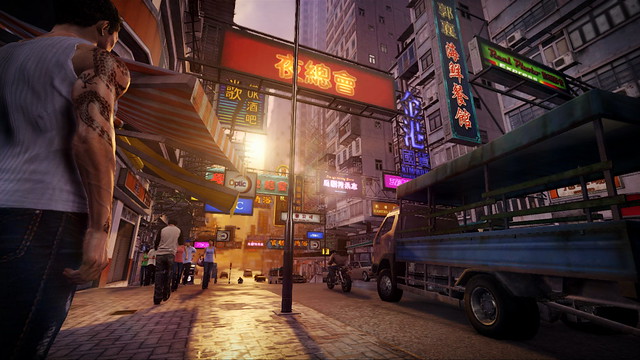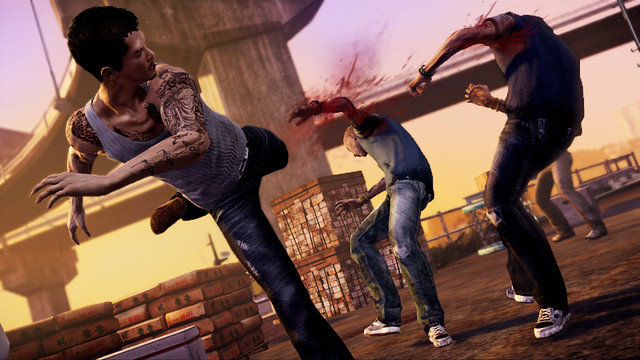
New from developer United Front Games in conjunction with Square Enix London Studios is Sleeping Dogs, the stylish tale of undercover cop Wei Shen and his journey through the murky world of the Hong Kong Triads. Executive producer Stephen van der Mescht of United Front Games took time out at E3 2012 to explain how Bruce Lee and PlayStation 2 classic Bully have helped shape this extremely promising title, and why we’re seeing gaming leave its teenage obsessions behind.
What is it about Hong Kong that inspires?
Stephen: So many things. Its history in cinema, in martial arts, kung fu, everything as far back as Bruce Lee, Jackie Chan, Chow Yun Fat, John Woo. What’s interesting for us is seeing those older action movies and the new wave of Hong Kong cinema like Infernal Affairs and that shift towards more serious story telling.
There’s such a richness there and, from a gameplay standpoint, you think about doing it in an open world where there are so many possibilities. And then there’s Hong Kong itself. Geographically it’s a very interesting place, especially Hong Kong Island, which is where our game focuses. The different neighborhoods are so unique and distinct, there’s a rich mix of tradition and technology. It really lends itself towards different gameplay styles, such as street racing and free-flowing combat. That’s what really attracted our attention.
So it’s open-world?
Stephen: Yep, sandbox gameplay, go wherever you want, in whichever order. There’s a whole narrative drive and lots of side quests, favors that you do for people, mini-games, even things like cockfighting, which is part of the world we’ve created.
How faithful were you to Hong Kong’s city planners?
Stephen: We took 35,000 to 40,000 reference photos and hour upon hour of video footage, but it’s not a street for street depiction. It was important for us to capture the essence of city. Lots of the landmarks are there, many of the names are similar yet, first and foremost, we wanted to make that space fun to navigate around.
Check out our full E3 livestream interview with United Front Games above.
How do you research each aspect of such an expansive game?
Stephen: There’s a lot of literature around on Triad hierarchy and structure. We wanted to be as authentic to that as possible. We weren’t interested in doing caricatures and stereotypes. We were fortunate enough to have a few contacts in Vancouver, where we’re based. There’s a big Chinese community there, lots of people from Hong Kong, and we managed to talk to the former head of the Hong Kong police force’s organised crime bureau. He’d been there 25 years orchestrating undercover operations so he knew the ins and outs of the local Triads, from the pettiest crimes all the way up to the high scale stuff.
There was also someone we became chatty with who gave us insight into how Triads work within their stamping grounds. It’s not how you imagine it, Triad culture. They’re not always thugs who hang out causing trouble. They’re well integrated into their local communities, and to summarily remove them would cause those local societies to crumble.
What has the expertise from former Need For Speed developer Black Box Games brought to United Front Games?
Stephen: The core of the studio was set up by those guys. We’ve been in operation now for five years, and there’s obviously a strong driving pedigree running through the game. We’ve taken a lot of time to optimise our vision of Hong Kong for driving around at stupid speeds. We have these high speed road networks that fit into the city very organically.
We also pulled in a lot of people from Rockstar who’d been working on PlayStation 2 game Bully as well as guys from Radical, so there’s a whole bunch of expertise there. Open world games are hard to develop and from the very start we wanted all of our bases covered with the talent we have. Our strategy’s been quite simple – we wanted to create a game where it felt like the core mechanics could stand up on their own.
If you try the combat system, it’s quite deep for an open world game. The ability to seamlessly move from that into gunplay and crazy fast driving maintains that sense of big screen action. You can jump off the back of a car or a bike, so you can see we’ve tried to maintain that cinematic action movie feel.
How closely do you look at similar, rival games like the Yakuza series and LA Noire?
Stephen: We always look at competitors and try to figure out what we can learn. For us, we looked at those kinds of games, but to be honest we paid more attention to Hong Kong cinema for our fighting styles and to nail that reactive sensation. It’s a number one priority of ours to try to make something feel different from games that might occupy a similar space.
Was PlayStation Vita integration something you considered?
Stephen: Sure, we thought about it, but we didn’t want to do it for the sake of shoehorning an extra feature into the game. I feel you really need a strong idea to really tie different devices together, with a unique experience delivered on each of those devices. I don’t like it when people try to fit a PlayStation 3 experience into PlayStation Vita. I like the idea of a different take that feeds back into the main experience.
Did you look to any particular cases or storylines from your research to include in the game’s narrative?
Stephen: Well, the plot was built from scratch but we were heavily influenced by a lot of references. Look at movies like The Departed and Donnie Brasco – they both had an element of truth in them, which came from the stories they discovered by talking to people who were actually in those situations. The important thing for us to get across was that dual world of a cop pretending to be a gangster, and the stresses that come with that, of having to live this lie.
In terms of specifics, we referenced a lot of Triad crimes using newspaper cuttings. The game follows this guy becoming more intertwined with this world and we see his morality line get blurred. So yes, there are direct references to stories we discovered from the research we did.
Were there any ideas that you had to filter out?
Stephen: That’s one of the constant processes that you go through. There’s always iteration and from that some ideas fall by the wayside. Some things don’t make sense, but the general themes for us seemed to fall into place quite naturally. Women for example are a strong theme throughout the game. The principal character loses his sister at a young age. He’s grown up with just his mother around, and it’s interesting to explore how he interacts with women. There’s no love interest though, funnily enough.
There’s a big loyalty riff throughout the game as well. He’s a cop but he actually starts befriending some of these gangsters, he starts to actually like these guys. I guess it’s like Stockholm syndrome. He even helps to plan one Triad’s wedding.
With a game like this, which has a very strong plot along with defined gameplay elements, what leads – story or mechanics?
Stephen: It’s a very organic process. Those two standpoints grew together, although at the very start we focused mainly on mechanics. They can be fun, there’s a lot of opportunity and then you think, “Well these parts could all lend themselves to something set in the criminal underworld”. A lot of the time while we were writing the story we were picturing scenes, the situations we wanted gamers to see. For instance, we wanted to have a big Chinese wedding, so that led to us then working out a way of blending the right gameplay segments into the scene.
I imagine it’s a little like writing a song. Sometimes the tune comes first and you drop some lyrics in, while other times the words come first and a tune naturally builds up around them.
What I don’t like is making a game to fit a story. The two elements have to grow and feel right together, and that takes time. If you start to come up against a barrier, it’s probably time to try a different tack. Some ideas pan out, some don’t. That’s the thing about developing games: sometimes you’ve got to walk away from ideas that look great on paper but don’t quite work.
Do you think that with the technical challenges of building games overcome, more resources can be poured into pushing content in new directions?
Stephen: I definitely think so. You look at The Last of Us, Beyond and the Uncharted series and they are the result of developers wondering how to get the best out of all this technology. Also, people are looking to be entertained on a different level now. The average age of gamers is creeping up, and you see life being reflected in these games now. You could almost call this hardware cycle the adolescent phase – it’s maturing, broadening its horizons and becoming aware of adult issues. There’s been a phase – and this is no fault of the industry, it’s just the way business works – of repeating successful games. But there’s no mistake, we are definitely seeing games, the stories they tell and the experiences they deliver evolve faster than ever before.














Comments are closed.
13 Comments
Loading More Comments